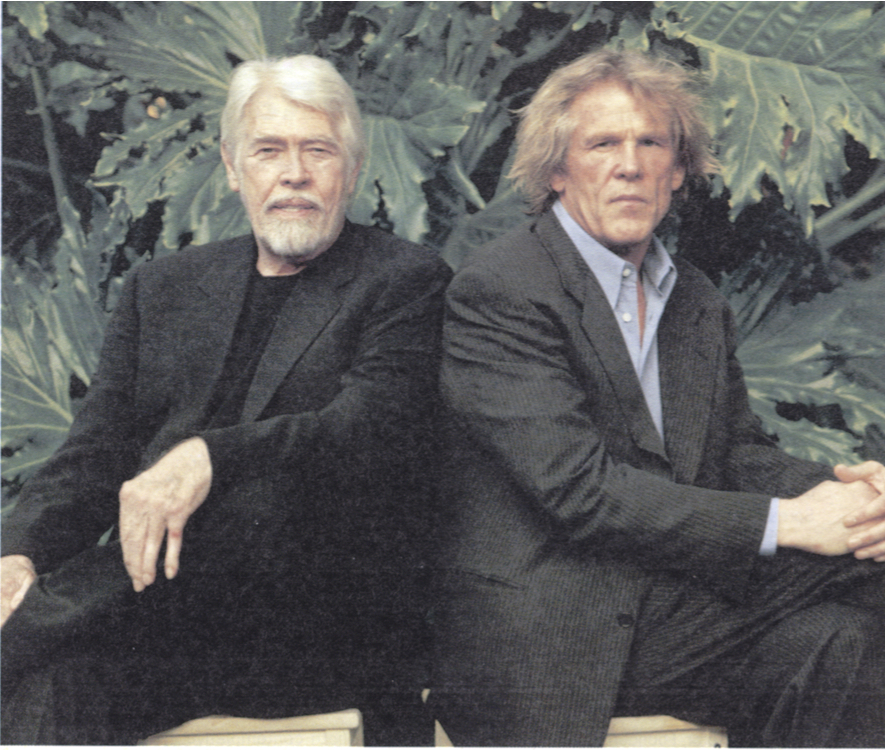Nick Nolte and James Coburn

ABOVE: AFFLICTION COSTARS JAMES COBURN (LEFT) AND NICK NOLTE. COBURN’S OVERCOAT, TOP, AND PANTS BY GIORGIO ARMANI. NOLTE WEARS HIS OWN PAL ZIERI SUIT AND SHIRT.
MEN WHO’VE BEEN THROUGH IT ALL: NICK NOLTE & JAMES COBURN
Two great pros tackle the perils of booze-fueled machismo in a gripping new drama.
When James Coburn, one of the screen’s most laconic tough guys, and Nick Nolte, one of its most complex, play father and son, don’t expect any New Age bonding. In the shattering new drama Affliction, directed by Paul Schrader, they portray old-style, hard-drinking, red-blooded men at odds with each other and with the changing rules of masculinity. The son tries to adjust to a world where, among other things, you can’t guzzle a beer while driving and you can’t beat your kids. But the father stubbornly upholds his violent, alcohol-saturated routine, even after his long-suffering wife dies and he becomes dependent on his son. Their dissent over what it means to be a man eventually leads to a scorching confrontation in which their actions blur the line between man and beast.
THELMA ADAMS: Affliction is so powerful because it explores the subject of alcoholism and the resulting cycle of abuse from the point of view of these two ordinary men.
JAMES COBURN: Yeah, and when you see the movie it elicits an immediate emotional response: Boom! That’s what drama is really about.
NICK NOLTE: Right. It’s not something you can put away on a shelf and say, Oh, that was fun but it doesn’t have anything to do with me.
COBURN: The men Nick and I play are ordinary, but they have extraordinary capabilities because of the anger that’s inside them.
NOLTE: Russell Banks [on whose novel the film is based] writes about how this core of violence has been passed down for centuries and centuries from one male to another, father to son. He compares the character I play, Wade, to a Neanderthal, a Cro-Magnon—he takes it all the way back to sitting around a fire.
COBURN: Gnawing on a bone.
NOLTE: The rage Wade has is primal; it comes from the instinct to survive. It’s way out of line today, but it’s still with him—it’s within all of us. I mean, we’re a society that has had more wars and killed more people than at any other time in history. That should tell us the anger’s there, no matter how sophisticated we think we’ve become.
ADAMS: Yet your accomplishment, Nick, is you’ve made Wade sympathetic, even though at times he behaves like a monster.
NOLTE: The audience has to feel all of Wade’s awkwardness—to feel for him and then get frustrated with him. You have to get them to say, “Jesus, can’t you do anything right?”
COBURN: “That’s not going to work, Wade. Don’t do it that way!” And it’s poignant. Here Wade is sitting in this little town, trying to be a human being, and everything he touches turns to shit. He wants to take care of his daughter. He wants a woman. He really wants to be a good man. And he is, except the methods he chooses are a little askew.
ADAMS: He seems to be in an intoxicated daze in which he can’t help but act abusively, even toward those he loves.
NOLTE: He’s trying to face up to generation after generation of violence. But he’s destined, by his genes and his experience, to give in to it. He doesn’t want to think of himself as a beast. Yet his father is there saying he is the beast.
COBURN: “I know you,” my character says in the last scene.
NOLTE: And Wade says, “You don’t know me.” But the father does know. He knows the beast is in there.
ADAMS: Affliction follows Wade’s struggle to change. Jim, does your character feel a similar need?
COBURN: He doesn’t think changing himself is necessary. But he does want his son to change, to become something. He wants Wade to eliminate his wishy-washy attitude—you know, Come on, be a man, stand up, have a drink.
ADAMS: The two of you seem like you’d be comfortable around the barstool. What impact did your personal experience have on the movie?
COBURN: Both Nick and I hit bottom a couple of times and have tried to achieve something beyond that. We’ve certainly straightened out our lives to the degree that we’re in control now. And there have been times when I, at least, have reached a point of rage and not really known where the rage comes from. One of the questions I asked Nick when we first started working on the film together was, “Where did the rage come from in you?” And he stopped and looked at me and said, “That’s a good question.” [laughs] And so we had to find the source of it. One of the greatest things about being an actor is you can really go into the depths, and unless you’re mad you can resolve everything.
NOLTE: I agree with Jim: You do come to a point where you can get your life in control a bit. But going through life, you discover these deep, dark things in yourself that you can’t run away from, so you have to learn to embrace them. I mean, the difference between a murderer and myself is only that I choose not to do it. But I’m capable.
COBURN: Everybody is.
THIS INTERVIEW ORIGINALLY APPEARED IN INTERVIEW’S FEBRUARY 1999 ISSUE.






